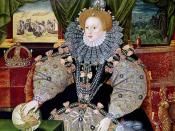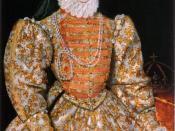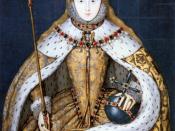In my opinion, I consider Elizabeth I a more authoritarian leader. This can be seen through her actions involving religion, succession, Spain, and finances. Elizabeth demonstrated her authoritarian leadership via religion. When Elizabeth I came to throne in England, the country was divided in its religious beliefs. The two main religion groups were the Catholics and Protestants. In view of the fact that both parties were strong, a religious war was most probable to occur if Elizabeth supported one religion and not the other. If this civil war so to speak broke out, Elizabeth would lose power and control. Since, she wanted the support of both parties, Elizabeth established a state church to satisfy the religious and maintain her power over all her subjects.
Also, Elizabeth I displayed her totalitarian leadership through succession. Mary Stuart, Queen of Scots, was a strong Catholic. Moreover, she possessed both the active support of the pope and the rulers of Spain.
Also, the devout Catholics of England hoped that Mary would become the queen of England. Mary Stuart tried to gain control of the English throne. However, despite the support of those prominent leaders, Mary faced a revolt from the Scots, who were converting to other denominations of Christianity, especially Presbyterian. Mary fled to England for protection, but it was told that she still sought the throne. Seeing as Elizabeth I might lose her control of England, if Mary's actions were pursued and she obtained the support and help from the English citizens, Elizabeth I ordered the beheading of Mary, Queen of Scots, her opponent, who may have obtained the throne, if not for her premature death. Elizabeth's ordered execution of Mary Stuart shows her desire to maintain complete control of England by not letting anyone become an obstacle or...


